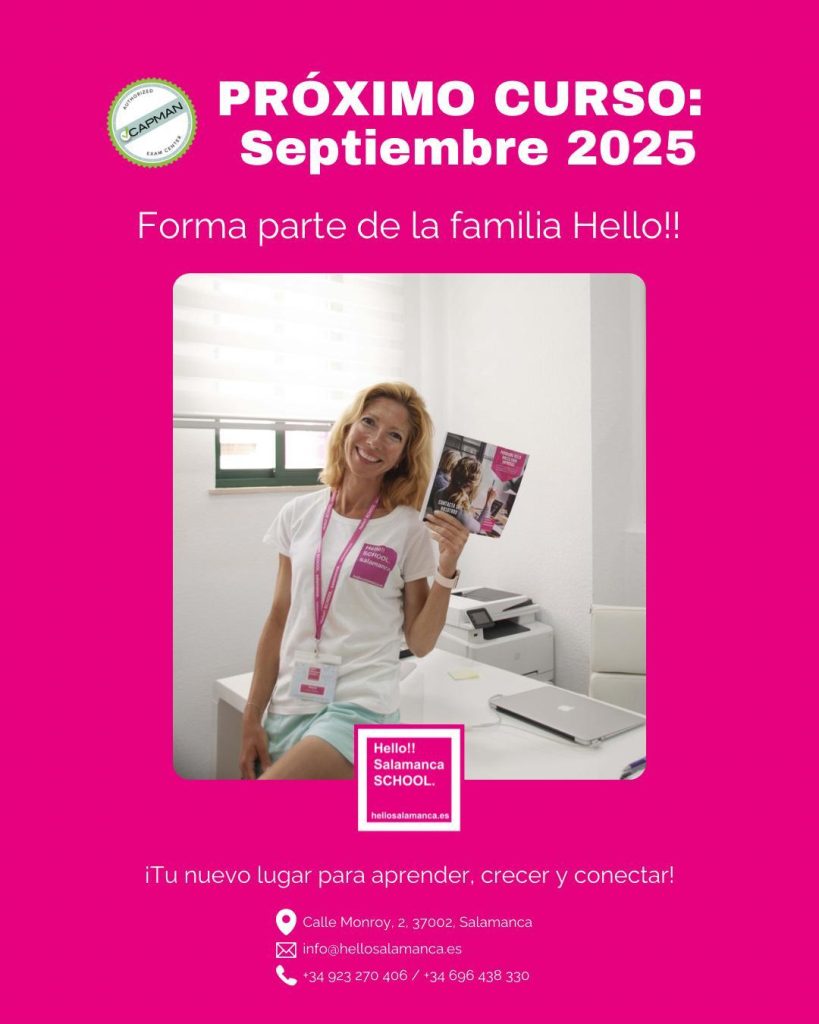Hello everyone! My name’s Eleonora and I’m a 21 years-old Italian girl who lived in Spain for 2 months, working in an English school. One year ago, I decided to apply for the Erasmus program offered by my university. I was accepted, so I started to look for a company where I could have carried out my 2 months summer internship. After a long, endless research I read, in one of the Erasmus companies lists, “Hello School Salamanca” which immediately caught my attention probably because I had already been to Salamanca and I loved it. I left Italy on the 28th of July and I remember that I was overwhelmed by a mix of feelings; I was excited since it was my first time doing an Erasmus internship but at the same time, I was just so scared because I would have been completely on my own. When I arrived, the first person I met was an American boy: my flat mate! I lived with him for the first month and then a Dutch girl and three French boys arrived; we were 6 and it was great because we got really close and had a lot of fun and I could also practice my English with them, even being in Spain. At the same time, I could obviously improve my Spanish working at the school and talking to a lot of Erasmus students and people who lived in Salamanca. At the school I did different kind of activities from writing for the blog to teaching English to a Spanish man; I recorded videos for kids in which I had to speak in English about different topics and I also helped doing different tasks in the administration office. During these 2 months I visited Sevilla, Huelva, Segovia, Ávila and Valladolid and now I can truly say that Spain “me encanta”! This Erasmus experience really helped me to be more confident while speaking in Spanish and most of all gave me the possibility to meet a lot of new people from all over the world. I think this is the best part of the Erasmus because I got really close to all my new friends and it was like I already knew all of them. However, the worst part of my Erasmus was leaving Salamanca and leaving all the people I met there. I remember that the week before I went back to Italy, my head was full of different emotions: I was looking forward to going back to Italy, seeing my friends and family and most of all eating Italian food; but at the same time, I felt so sad and nostalgic because I knew I had to say goodbye to all the beautiful people that had become my friends. Before leaving for this experience, my biggest fear and challenge for me was getting out of my comfort zone but it is exactly what I did (and also quite well I have to say) by going to Spain for two months, and it turned out to be easier and more pleasant than I thought. Anyway, being an Erasmus student or intern is an experience that everyone should make: it is a real opportunity to meet a lot of new people, new cultures, new mindsets, to make new friends, to become more open-minded and to enrich your life by getting out of your comfort zone and explore the beautiful world out of it!
LEARNING ENGLISH WITH IDIOMS
Every Country’s culture is characterized not only by food, religion, traditions…but also by its own language. Every language in fact has particular expressions called idioms that reflect the country’s culture. Idioms are words or phrases that aren’t meant to be taken literally and usually have a cultural meaning behind them indeed. Here you can find some of the most common idioms that you can use while talking to native English speakers and feel more confident. ‘The best of both worlds’– means you can enjoy two different opportunities at the same time. ‘Speak of the devil’ –this means that the person you were talking about actually appears at that same moment. ‘See eye to eye’– this means agreeing with someone. ‘Once in a blue moon’– an event that happens infrequently ‘When pigs fly’ –when something is impossible, that will never happen ‘To cost an arm and a leg’– when something is very expensive ‘A piece of cake’– when something is very easy ‘Let the cat out of the bag’– to accidentally reveal a secret ‘To kill two birds with one stone’– to solve two problems at once ‘To cut corners’– to do something badly or cheaply ‘To add insult to injury’– to make a situation worse ‘You can’t judge a book by its cover’– to not judge someone or something based solely on appearance. ‘Break a leg’ –means ‘good luck’ (often said to actors before they go on stage) ‘A blessing in disguise’ – A misfortune that eventually results in something good happening later on. ‘Call it a day’ – Stop working on something ‘Let someone off the hook’ – To allow someone, who have been caught, to not be punished. ‘No pain no gain’ –You have to work hard for something you want ‘Bite the bullet’ – Decide to do something unpleasant that you have avoiding doing. ‘Getting a taste of your own medicine’ – Being treated the same unpleasant way you have treated others ‘Giving someone the cold shoulder’ – To ignore someone ‘The last straw’ – The final source of irritation for someone to finally lose patience ‘The elephant in the room’ –A matter or problem that is obvious of great importance but that is not discussed openly ‘Stealing someone’s thunder’ – Taking credit for someone else achievements
HOW MUCH DO YOU KNOW ABOUT ‘INTERPRETING’?
Interpreting is a dynamic activity and the primary goal is to convey somebody else’s ideas. Is interpreting really about memory exercise? Well, not exactly. It is mandatory to be intellectually involved in the speaker’s thought process. There are many types of interpreting such as Consecutive interpretation, Simultaneous interpretation and Chuchotage. Consecutive Interpretation In consecutive interpreting, the interpreter speaks after the source-language speaker completes one or two full sentences. The speech is divided into parts, and the interpreter sits or stands beside the source-language speaker, listening and taking notes. When the speaker pauses or finishes speaking, the interpreter renders the message in the target language by interpreting his own notes. The important thing in this case is that the interpreter should maintain eye contact with the audience as much as possible: notes are just a small aid for the interpretation. Simultaneous Interpretation Simultaneous interpreting is when the interpretation is rendered almost at the same time the speaker is speaking. Unlike consecutive interpreting where note taking is necessary, there is no time for that during a simultaneous interpreting session. Instead of using notes and your short-term memory, you would use your immediate short-term memory in this circumstance. Chuchotage The interpreter is seated or standing among the delegates and interprets simultaneously directly into the ear of the delegates. Whispered interpretation can be used only for very few delegates sitting or standing close together. It is used mainly in bilateral meetings or in groups where only a few delegates do not share a common language in order to save time. Some curiosities you need to know Anticipation: since the message is still in progress as you’re relaying the interpretation, being able to anticipate what is upcoming can be very helpful. Familiarity with the topic is a must. To practice, pay attention to how people around you speak. Decalage: is the length of time between the start of the speech and the beginning of your interpretation. A longer decalage allows for higher accuracy because you get more context before interpreting. In your training, challenge yourself to increase your decalage. Selection: one of the downsides to simultaneous interpreting is that sometimes, due to the speed in which the message needs to be conveyed, the interpreter isn’t able to catch everything, leading to some omission. Being selective is mandatory.
ENGLISH KEYWORDS TO SURVIVE THE AIRPORT!
Travelling is something that each one of us has done at least once in our life. However, not everyone has ever travelled by plane and for this reason this blog is perfect if it’s your first time in an airport! With holidays or business trips about to begin or come to an end, it’s important to talk about some fundamental English words which will be useful at the airport. First of all, before you leave your house for the airport, be sure to print out your confirmation number. A confirmation number is a personalized number given to you when you purchase your plane ticket. The check-in counter will surely ask for this along with your passport. Once they check you in, you will receive your boarding pass. This is your official ticket to get on the plane. After you check-in your luggage and receive your boarding pass, you will be asked to move through security. Now, it’s time to find your plane. Your plane will be waiting for you at your specified departure gate. Your departure gate is on your boarding pass. It’s usually a number and a letter. This is the place where you show your ticket and board the plane. Don’t get there too late or they will close the gate. After you board your plane and find your seat you will be asked to store your carry-on luggage in the overhead bins. This refers to the smaller bag that you have taken with you onto the plane. Now it’s time to sit back, relax and enjoy the flight. Once you land, you need to find your luggage at the baggage claim area. The baggage carousel is the long moving circle that has many bags on it. Check the bag tags to be sure you pick up the correct one. The last thing you need to do is finding the exit of the airport and enjoying your journey! Now that you have the right vocabulary, you are ready to embark on any trip with no worries, no hassle and no miscommunication.
HOW TO DESCRIBE YOUR MOOD IN ENGLISH
We all know that if someone asks “how are you?” we can answer saying “I’m good/I’m fine”. But if you stop to think a little about this, there are a wide range of human emotions that can’t be expressed with a single and simple word. Fortunately, each language has not only words but also diverse idiomatic expressions to try to define the different moods and feeling of a human being. In this article, you can find some idiomatic expressions to describe your humor that you can use when someone asks “How are you?”. Some may be the same as in your native tongue, while others can be found only in the English language. On cloud nine If you are “in the clouds”, this indicates extreme happiness. On pins and needles Literally meaning on pins and needles, this indicates a state of suspense and tension. Mixed feelings This expression literally means what it says. It conveys a condition in which there are diverse feelings happening at the same time which can contradict each other. Fed up This phrasal verb indicates a condition of frustration in relation to a situation that has truly become untenable. Chip on his shoulder This metaphorical expression is used to describe a behavior that denotes the discomfort and anger of someone who has been treated unjustly. Go to pieces If you go to pieces, you fall apart. This phrase indicates deep pain. Shaken up This phrase means you are shocked. It indicates the dazed feeling after strong, unforeseen, or unexpected news. Feeling under the weather This expression is linked to the British climate and the seasonal diseases that winter can bring. It indicates a state of general malaise and can be translated as not feeling good. Mentioning the weather brings to mind the seasonal discomfort and cold that a humid and rainy climate carries with it.
GUIDE TO BE (ALMOST) A PROUD ITALIAN COFFEE ADDICT
In the previous article we gave you some tips to start perfectly the academic year. Once you follow them, you would be able to survive the school but there’s still one more tip missing… drink COFFEE! If you are already in the middle of your first exam session you will definitely need to follow this advice in order to have lot of energy and be more productive. Coffee was introduced in the 1500s. Since then, Italy has boarded the train by taking the beverage and putting its own authentic and classic spin on it by creating their own unique blend of Italian Coffee Drinks. Italian coffee drinks are something of an art, built on tradition and simplicity and many of the traditional bars have been in the family for generations. There are many different types of Italian coffee drinks. Let’s explore the main ones and consider this ‘coffee experience’ as your unofficial orientation ceremony to Italy! Caffè Espresso Caffè is the Italian word for coffee, but it is also what Italian people use to order an espresso, the most common type and your first step to becoming less of a “straniero” (foreigner). Espresso is a single shot of caffeine and if you’re feeling particularly wild, you can opt for a “doppio”, a double espresso. You can have it with sugar or, if you like bitter taste, without sugar. Remember: in Italy a caffè is drunk at all times of the day- it brings on the energy! Caffè Ristretto It’s similar to a caffè espresso as it’s a single shot of espresso, but it contains less water, thus giving it a more concentrated flavor. This is something perfect when you only have time for one sip which makes sense from the meaning of the name: ristretto means ‘restricted’. Caffè Lungo Lungo means “long” but, very important my fellow coffee addicts, this is not a caffè Americano. Instead, it’s the perfect bridge between a caffè normale and a traditional filtered coffee of the Anglo-American world. There is more water than a caffè, but it’s the same water that’s run through the espresso grounds, and not hot water that is added in at the end like in the Americano. Cappuccino This is the second most iconic Italian coffee drink, after the caffè. It’s made with 1/3 espresso, 1/3 steamed milk, and 1/3 foam. In fact, the name “cappuccino” comes from the brown color of the robes of ancient Capuchin Monks. The cappuccino comes with some very serious rules- it is a breakfast coffee and is never drunk by Italians after 11 am. Moreover, in order to be a true Italian, you should try eating a croissant by immersing it in the cappuccino: if you don’t do this at each breakfast, then you’re not having a real breakfast! Macchiato A macchiato, which means “stained” or “spotted” is the perfect mix between a caffè and a cappuccino. It’s an espresso that is “spotted” with a drop or two of hot steamed milk on top. Many Italian people find the quantity of milk in a cappuccino to be too much but a straight caffè to be too strong, so this is the perfect happy medium. All this may be enough to start your Italian journey; but if you want to discover Italy 100%, you should also try Caffè Shakerato, Crema di Caffè and Caffè Marocchino!
8 TIPS TO START THE SCHOOL YEAR OFF RIGHT
A new academic year is about to start! Do you feel thrilled and excited or just sad because your summer vacation is over? In this article you’re going to read some tips you should follow to actually enjoy studying and be productive since your first day back to school! Go school shopping for your school supplies First of all, let’s go have some fun buying all the things you need to start your year. You will need a backpack, pencils, pens, paper, folders… Buy the folders you like best, dress them up with stickers or doodles. The more amusing your folders are to you, the more you will love to take them out and do your homework! Make an outline of your plans and goals Set both short-term and long-term goals. With these little steps, you can do a better job obtaining good results. Planning is a useful thing to do if you want to check how your productivity and achievements are going. Work on your time-management skills Being organized is a good quality for a person who studies. If procrastination has always been your problem, a new academic year is a perfect time to get rid of this annoying habit. During the summer, you had the chance to spend your time any way you wished. Once fall comes along, it’s a good time to start scheduling. Arrange your studying environment You should comfortably organize your working environment at home so that studying would be a pleasant activity to do. If you prefer sitting with a laptop on your bed and simply hate your desk, make sure everything you need for your daily studying is near the bed, within your reach. Join some teams or clubs It’s really important to combine study and other activities. They will be really helpful to get rid of all the stress you have to cope with because of some exams. It is a great opportunity to make new friends and to free your mind so that you can study in a more productive way. Be open to new friends School is all about learning. Part of what you will learn is how to get along with different personalities, and that’s really what life requires you to do. Growing up sometimes means that we have different interests than we did before, and the friends we used to have don’t always share them – that’s okay, it just means you’re both moving on with your lives and growing in different directions. Do not panic if you hear “there will be a test tomorrow” If you panic, it will not help. It may just make things worse. Relax and go over your notes and textbook. If you create a mental picture it in your head, it’s more likely you will remember that picture while doing the test. Moreover, don’t be afraid to ask for assistance regarding the issues you don’t understand; help from peer students can be good and very productive. Consider this year as a fresh, brand new school year Do you want to leave all the troubles of last year’s school year behind you and start fresh? Just do it! Think positive and leave all your troubles, bad grades, enemies, and fights behind. Start FRESH! To begin something new is always amazing. And now you are ready to start perfectly even a new school year! You have great opportunities and so many new experiences to do. Just grab all of them.
7 ENGLISH WORDS YOU NEED TO KNOW TO KEEP UP WITH FASHION
Fashion vocabulary has always been characterized by French language, but nowadays it seems to be cooler and trendier thanks to the use of English expressions and technical words to describe fabrics, pieces of clothing, shapes and colors. We are talking about a real English restyling of the fashion vocabulary. Here some examples: fuseaux –> leggins paillettes –> glitter culottes –> slip/boxer Moreover, there are 7 English words that are essential to know if you are interested in fashion. Nude look: it is characterized by transparent clothing that allows us to glimpse the body shape. Nude look is linked to color nude which represents all those color shades such as ‘cipria’ (pale pink) and beige “matching” the skin color. Old-fashioned: it is the English translation of demode which doesn’t necessarily mean out of style, no longer fashionable. An old-fashioned item of clothing, indeed, is inspired by a past trend and someone considers it also as a vintage Ready to wear: it is the English translation of Prêt-à-porter and it refers to clothes that are sold in standardized sizes and not made-to-measure. Fast fashion: it concerns all the brands, such as Zara – H&M – Bershka, that deliver their pieces of clothing to the consumer in a very short delivery time. Capsule collection: its aim is to offer the consumer a collection made up of clothes that can be matched in different ways. Must have: it refers to something you can’t live without if you always want to be trendy. Clutch: probably you know this accessory as pochette; the English clutch is a small bag without handles perfect for a dinner out. This new vocabulary of fashion is definitely reaching more international consumers and it perfectly fits what fashion means: show something new that none has ever seen or heard of!
MOVIE TITLES TRANSLATION
Don’t judge a book by its cover, even if you are in front of a movie to choose. In this case the translation of movie titles plays a fundamental role. The title of a movie should be catchy and should evoke the theme of the film. Why it is so difficult to choose the right translation for a movie title? Many times, movie titles are translated with funny words and phrases which are completely different from the original ones. The weirdest translations are related to movie titles translations from English to other languages. Let’s consider the case of the film ‘Southside with you’ by Richard Tanne. Inspired by Barack and Michelle Obama’s first date, ‘Southside with you’ talks about the summer day in 1989 when a charming young law associate named Barack Obama tries to charm reluctant attorney Michelle Robinson during a daylong date ending with their first kiss. The film focuses also on different issues such as black people’s condition in America, white people’s prejudices and parent-child relationships. ‘Southside with you’ is the original title of the film and it is related to the ‘Southside’ which is the district in Chicago where Michelle and Obama first met. However, the Italian version presents the title ‘Ti amo Presidente’ which evokes in the audience a misleading idea of the movie: the film is about a first date day and the words “ti amo” (“I love you”) are not really appropriate especially for a first date! In France, instead, this movie was presented as “First Date” which absolutely seems to be a better translation, as it clearly shows what we are about to watch in the film: the story of Michelle and Barack’s first date. If we go to Spain, we can find this movie with the title “Michelle y Obama”: it’s a more generic title but it fits better the plot of the film and it’s not as romantic as the French and Italian versions. As we can see there are different ways to translate movie titles, some are really good and others are not…it’s up to the translator! However, there is one thing that we understood today: the translation process is not as easy as many people think!
ENGLISH SUMMER EXPRESSION TO KEEP IN MIND WHEN YOU GO ON HOLIDAY
Summer is the most loved season of the year; summer means holiday and during holiday many people try to find ways to stay cool in the heat and others to get outdoors and away from routine. If you go on holiday abroad, you will probably have to speak in english and for this reason you will need these expressions to stay cool even while talking to other people. Catch some rays it means: to sit or lie outside in the sun; to sunbathe and get tanned Travel on a shoestring it means: to travel with a very small amount of money because you are trying to save money Dog days of summer it means: the hottest days of summer; the hottest time of the year. Off the beaten path it means: a place where few people go, that is not frequently visited and is not well-known because it is not the typical tourist attractions Beat the heat it means: to avoid the heat of summer; to make oneself cooler or go to a place to stay cool, especially during hot days in summer. Soak up the (some) sun it means: to enjoy the sun; to sit outside in the sun. Now you’re ready to leave for summer holidays and to make new friends all over the world!












